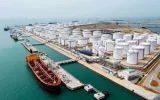
A member of the Majlis National Security Commission still threatened to close the Strait of Hormuz, while such a speech may seem attractive to the general audience, in fact deepest disregard for Iran's economic and geopolitical realities. The key question is if the Strait of Hormuz really closes, who is most damaged? The answer is clear, Iran itself. Even if the country's oil exports reach 6,000 barrels a day, there is still no other way than to cross the same strait.

The Strait of Hormuz, a vital artery for global energy exports, remains an irreplaceable bottleneck. Any disruption to the flow of oil through this route would alter the geopolitical equations of energy; despite efforts by countries to design alternative routes, none are able to cover the crisis.

The US attack on Iran's nuclear facilities and official participation in the Israeli operation is the largest military action by the West against Tehran since the 1979 revolution. Despite the renewed missile barrage by Iran on Israel, there has been no decisive response to the United States yet. However, the initial positive vote by the Iranian parliament to close the Strait of Hormuz has sounded the alarm bell for the global oil market.

Approximately 30 percent of the world’s oil and a third of the world’s LNG (liquefied natural gas) pass through the Strait of Hormuz every day. With tensions escalating between Iran and Israel and the US joining the war, closing the Strait of Hormuz is one of the options on the table for Iran to pressure its enemies, a move that would immediately reduce global oil supplies and drive up prices.

Rejecting rumors of an attack or sabotage in the recent fire incident on three oil tankers near the Strait of Hormuz, Ambrey Maritime Security Company announced that the incident was not a "security" incident and likely occurred due to a technical collision between two vessels.

From January to September, China imported 4.2 million barrels per day of crude oil through the Strait of Hormuz, accounting for 43% of the country's crude oil. Also, nearly 60% of New Delhi's imports are through neighboring countries in the Persian Gulf, which shows the great importance of the Strait of Hormuz for these two countries.

Ali Asghar Zargar said: If Iran decides to disrupt the movement of oil ships in the Strait of Hormuz, there is no doubt that it will affect the price of oil even in the short term.

Israeli media claimed that an Israeli oil tanker was seized in the Strait of Hormuz.

2024 seems to be the year of challenges for the strategic straits of the world. The drought in the Panama Canal is such that only 24 ships can pass through it every day.









